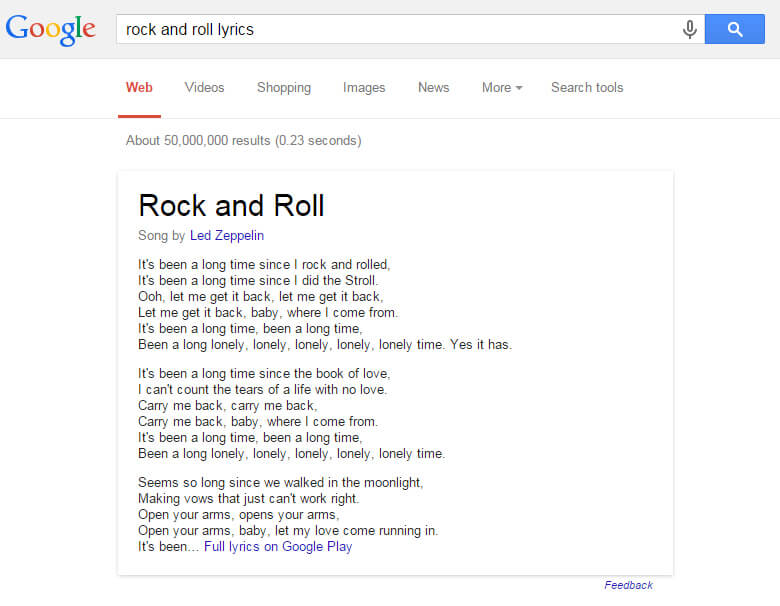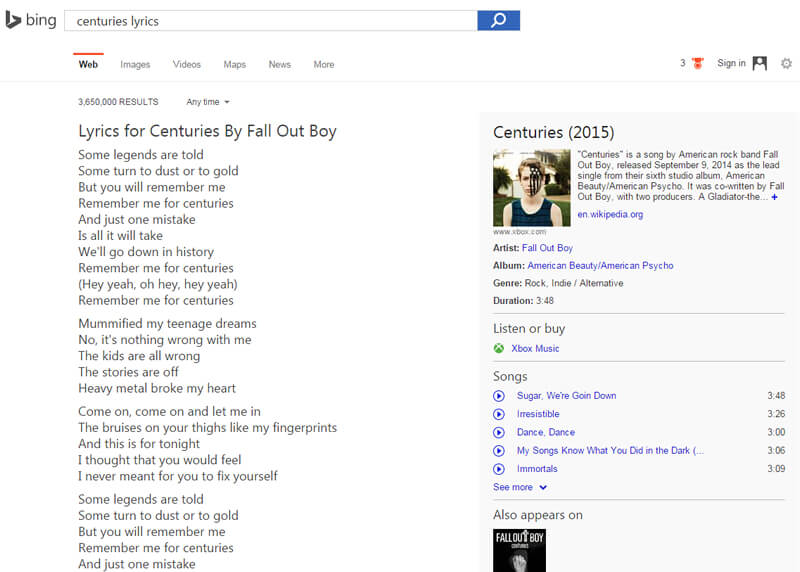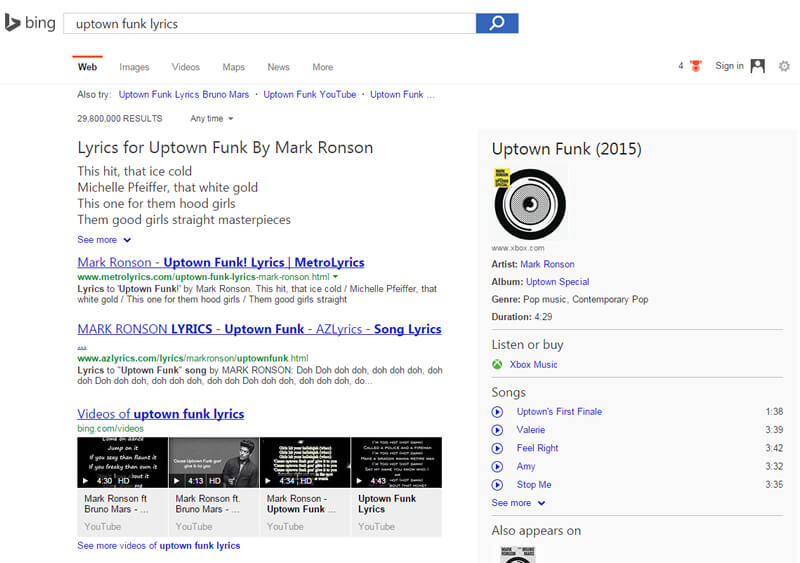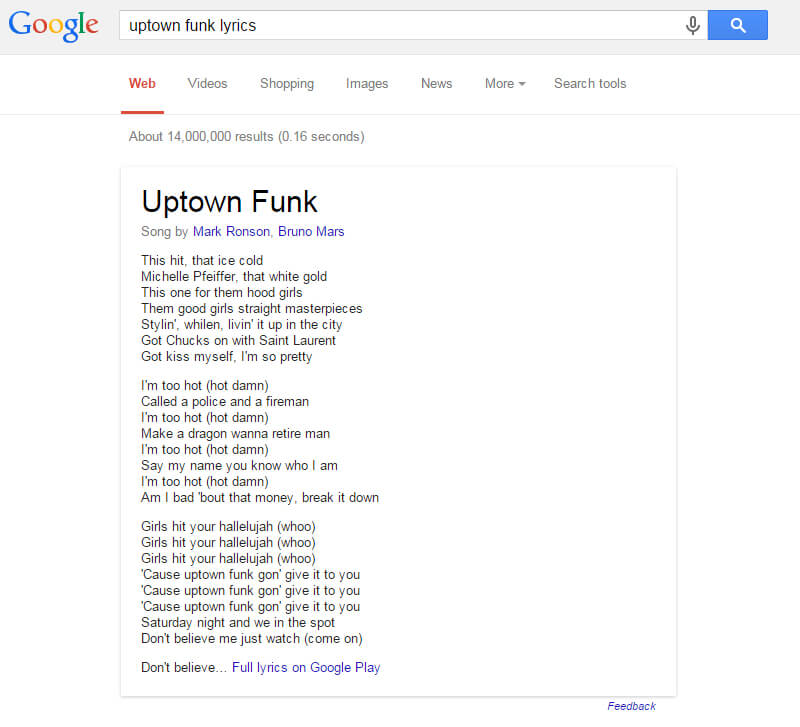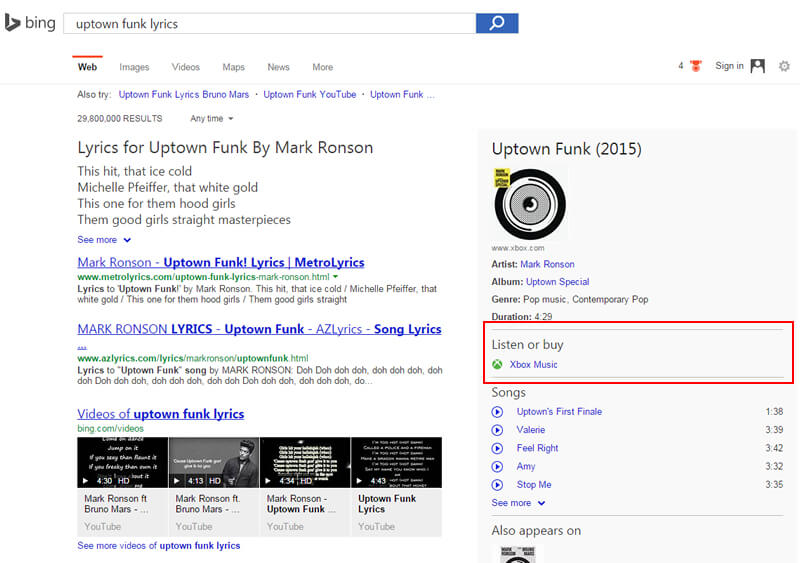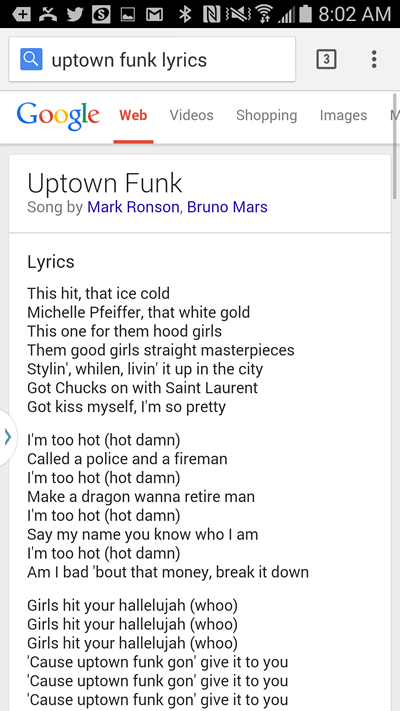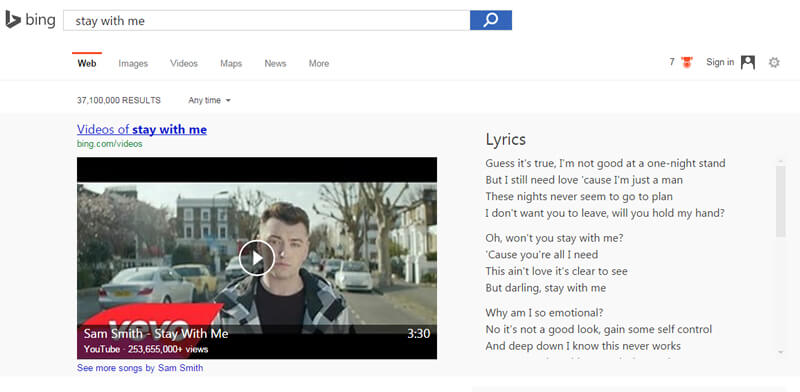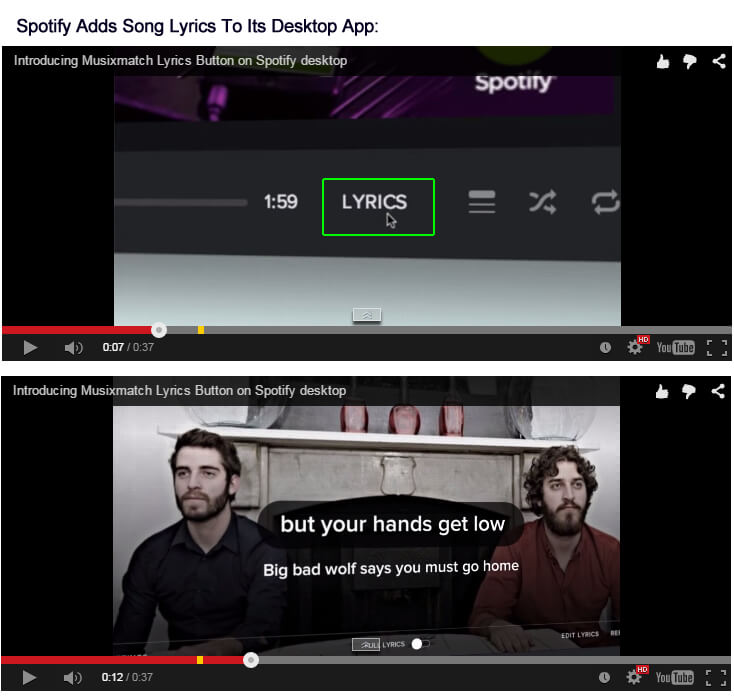Song Lyrics Hit The SERPs: Analyzing Google & Bing Traffic To 5 Large-Scale Lyrics Websites [Case Study]
Many have noted that 2014 was a bad year for lyrics websites, but contributor Glenn Gabe set out to quantify the impact of search engines displaying song lyrics directly in the results pages. Read on for his findings!

In early February, I published a case study detailing the impact of song lyrics being presented directly in the Google search engine results pages (SERPs). It’s just another example of the search engines providing direct answers to questions.
As you can guess, lyrics hitting the SERPs is potentially a game-changer for the song lyrics niche, which has faced a number of tough Google obstacles in 2014.
Those obstacles included the infamous April 2014 algorithm update that pummeled a number of prominent lyrics sites, as well as Google Panda, which continually caused problems throughout the year (and still keeps lyrics website owners up at night).
Although the 2014 algorithmic obstacles were tough to deal with, there was another big shift about to happen. This time, it would be Google’s Knowledge Graph and Bing’s Satori presenting new challenges, as both search engines started providing lyrics directly in the SERPs in the fall of 2014.
It’s one thing to deal with algorithm updates, but it’s another to compete with the Knowledge Graph. For example, here’s a Google search in the U.S. for “rock and roll lyrics” by Led Zeppelin:
If you’re a lyrics website owner, what you see above is cause for concern. Each search engine has its own unique take on providing lyrics in the search results, which I’ll cover in this post.
As you can guess, major search engines competing with you can absolutely limit downstream traffic — and when your revenue is advertising-based, less traffic means less revenue. So this is potentially a grave situation for many lyrics websites. (I use the word potentially based on the current limits the engines have in place with regard to providing lyrics in the SERPs. I’ll explain more about that below.)
Lyrics Traffic Data
Since the spring of 2014, I’ve been helping several large-scale lyrics websites deal with the various algorithm updates mentioned earlier. Of course, just as a number of those sites recovered traffic-wise (in the summer and fall of 2014), song lyrics began hitting the SERPs.
Talk about a roller coaster ride! Some sites saw a drop of 60%+ from Google organic due to Panda or the April 2014 update, only to recover and then face lyrics in the SERPs. Not good, to say the least.
I spoke with my clients to see if I could analyze the impact to their organic search traffic based on lyrics hitting the SERPs. There were many questions I had based on the situation. For example, would users simply get what they needed from the SERPs and move on, or would they still visit lyrics sites for more information? And how extreme of a drop in traffic would the sites experience (across both Google and Bing)?
Initially, three of my clients let me analyze the situation and include their data in the case study I published a few weeks ago. After that case study was published, two more lyrics websites also agreed to let me analyze their traffic and use their data for my research. So in total, I heavily analyzed five large-scale lyrics websites to determine the impact of song lyrics hitting the search results.
Combined, the sites have over eight million web pages indexed, drive over 35 million visits per month from Google organic, and drive close to three million visits from Bing organic — so I had a lot of data to play with. I started by analyzing the Google situation.
The Google Impact: Quick Summary
My first job was to analyze the impact of Google providing lyrics in the SERPs, which rolled out on December 19, 2014. My initial case study provides all of the findings, but I’ll include a quick summary below. (I’ll dig into the Bing impact next.)
My goal with the initial Google analysis was to:
- Isolate Google organic traffic from the United States. (So far, Google has only rolled out lyrics in the SERPs in the U.S.)
- Identify songs that now yield lyrics in the SERPs. Only certain songs yield lyrics in the search results due to licensing restrictions, so it was important to segment those songs to identify the impact.
- Identify songs with stable impressions in search via filters in Google Webmaster Tools. You can read my case study to learn more about the process I used and the filters I set up.
- Isolate queries that focused on “lyrics” and not “meaning.” There are a lot of people looking for the meaning of songs, and Google does not provide lyrics when “meaning” is in the query (for now anyway).
- Identify the impact to both desktop and mobile traffic from Google organic in the United States. As you can guess, lyrics in the desktop SERPs take up a lot of space. But just wait until you see lyrics in the mobile Google SERPs — they take up the entire screen! The lyrics-seeking audience skews heavily mobile, so understanding the impact to both desktop and mobile was important.
Based on heavily analyzing the three (now five) large-scale lyrics sites, you could see a significant impact when using the criteria above. Below, I have included a sample of the results so you can see the impact when comparing the timeframe after lyrics hit the SERPs to the previous timeframe:
“Bang Bang” Lyrics by Jessie J, Nicki Minaj and Ariana Grande
Google Organic Desktop U.S. Traffic: Down 32%
Google Organic Mobile U.S. Traffic: Down 47%
Google Webmaster Tools Clicks: Down 66%
“Fireproof” Lyrics by One Direction
Google Organic Desktop U.S. Traffic: Down 44%
Google Organic Mobile U.S. Traffic: Down 40%
Google Webmaster Tools Clicks: Down 29%
“All of Me” Lyrics by John Legend
Google Organic Desktop U.S. Traffic: Down 39%
Google Organic Mobile U.S. Traffic: Down 14%
Google Webmaster Tools Clicks: Down 61%
“Comfortably Numb” Lyrics by Pink Floyd
Google Organic Desktop U.S. Traffic: Down 46%
Google Organic Mobile U.S. Traffic: Down 17%
Google Webmaster Tools Clicks: Down 43%
Indeed, there was a big impact from lyrics hitting the Google SERPs. It was clear that many users were getting what they needed by viewing lyrics in the search results instead of traveling downstream for more information about the song, artist, etc.
It’s important to note that Google is pretty restrictive query-wise for when it provides lyrics in the SERPs. For example, if you add additional keywords like “meaning” or “video” to your query, you often don’t get lyrics in the SERPs.
For example, if you add “meaning” to the above query for “rock and roll lyrics” in Google, you don’t see the lyrics displayed in the SERPs:
That’s why it was important to weed out queries that didn’t surface lyrics. (Bing handles the query situation differently, which I’ll discuss soon.)
Lyrics In The SERPs: Don’t Forget About Bing
While I heavily analyzed the Google impact to lyrics site traffic from the U.S., we should not forget about Bing.
A lot of people don’t realize it, but Bing beat Google to the punch with providing lyrics directly in the SERPs. Bing rolled out that functionality in early October, while Google rolled it out in late December.
Believe it or not, Bing also drives a significant amount of traffic to lyrics websites. Sure, it’s not Google-like traffic, but it’s not trivial either. When you combine the traffic from all five sites I analyzed, Bing organic drives close to three million visits per month.
I dug into the Bing organic data the best I could using the tools available to better understand the impact of Bing providing lyrics in the search results. There are definitely differences between how Google and Bing trigger and display lyrics, so I was extremely interested in seeing how the traffic differences matched up.
I’ll start by explaining the SERP treatment in Bing and then cover my findings based on analyzing the five large-scale lyrics websites.
Bing Rolls Out Lyrics In The SERPs On October 7, 2014
As I mentioned above, Bing was first to roll out lyrics in the SERPs on October 7, 2014. Lyrics hit the search results only in the United States, and only for certain songs (again, due to licensing restrictions).
Bing started with about 500,000 songs and explained that it would grow that number over time. It was only for Bing proper and not Yahoo — remember, Bing drives Yahoo search (both organic and paid), but Yahoo does not provide lyrics in the SERPs yet. That could change, but for now it’s just Bing in the United States.
Here is a Bing search for “centuries lyrics”:
SERP Treatment: Bing Vs. Google
Before I provide my findings, I wanted to quickly explain the differences in SERP treatment for lyrics between Google and Bing. How the lyrics are presented can absolutely impact subsequent traffic from the engines, so it’s important to point this out.
For example, here’s a Bing search for “uptown funk lyrics” on a desktop computer:
And here’s a Google search using the same query:
For Bing, the lyrics are initially collapsed and don’t take up a ton of SERP real estate. If you click the “See more” link, the entire lyrics hit the search results.
This is slightly different from the way Google handles the situation. Google provides most of the lyrics directly in the SERPs (revealing most of the lyrics from the start). You can then visit Google Play for the full lyrics — and of course, you can listen to or buy the song right there.
Bing, on the other hand, is ready and willing to provide the full lyrics directly in the SERPs and is monetizing the lyrics in other ways.
For example, there are often links in the right sidebar to buy songs on Xbox Music, iTunes, and Amazon MP3. From what I can tell, Bing is only monetizing the Xbox Music transactions since Xbox is owned by Microsoft. But that can change, especially based on how lyrics in the SERPs perform over time.
Now, the screenshots above are from a desktop browser. Watch what happens when you search from a mobile phone:
Boom! The lyrics take up a majority of the screen. Bing still requires you to click the “See more” link, but Google simply provides the lyrics in the SERPs.
Remember, the lyrics audience skews heavily mobile. Some of the lyrics sites I analyzed have over 60% of their traffic from mobile devices now, so the mobile treatment is extremely important.
Bing Providing Lyrics For Expanded Queries
Bing is also much more lenient, query-wise, when triggering lyrics in the search results. For example, if you add “meaning” to the query, you still get lyrics (unlike Google). Similarly, if you just search for the name of the song (without “lyrics”), Bing will often still provide the lyrics. Again, Google will not do this unless it knows you are searching for lyrics specifically.
Here is a sample of Bing providing both the video and the lyrics in one shot when searching just for the song title. This is definitely more aggressive than Google’s implementation:
Process Of Analyzing The Bing Impact: Limitations Arise
As with the Google analysis I performed, I needed to isolate organic traffic from the United States only since lyrics in Bing have only rolled out in the U.S. so far. Then, I wanted to isolate desktop and mobile traffic to see the impact for both (separately).
There’s also the song limitation issue, where only certain songs are yielding lyrics in the SERPs due to licensing restrictions. Finally, I wanted to isolate songs that saw stable impressions throughout the rollout.
I was able to accomplish all of this for Google, which was great; however, Bing provided some challenges at getting certain data.
When analyzing the Bing impact, I could use a similar approach of using Google Analytics segments to isolate Bing organic traffic from the United States for both desktop and mobile. That wasn’t a problem and would surface queries and pages that saw significant changes in traffic once lyrics hit the SERPs.
Additionally, Bing still passes keyword referral data to Google Analytics, so I could see the drop to specific pages in the reporting, in addition to drops for specific queries (all in one place). I could then align that with what I was seeing in Bing Webmaster Tools.
However, in Bing Webmaster Tools, the functionality for slicing and dicing search query data isn’t as strong as Google Webmaster Tools. Sure, you have six months of data to play with, which is great, but I was trying to isolate Bing data from the United States only. That turned out to be extremely challenging.
For example, I could easily use a filter in Google Webmaster Tools to isolate data from the United States. That wasn’t possible in Bing Webmaster Tools. Also, the data for the Search Keyword report in Bing Webmaster Tools contains combined data from Bing and Yahoo.
Since lyrics only rolled out in the Bing SERPs and not Yahoo (yet), it was important to isolate search query data from Bing only. Unfortunately, the reporting could not be separated for just Bing — and, as I said earlier, I needed U.S. traffic from Bing, and not global.
Combined Bing & Yahoo Data (Globally):
Filters In Google Webmaster Tools For Query, Country & Search Property:
Needless to say, I was disappointed that I couldn’t slice and dice Bing Webmaster Tools data. That would make it tougher to correlate lyrics in the Bing SERPs to a drop in traffic.
That said, I analyzed a lot of traffic data across queries, song pages, and from different countries, and definitely saw a trend based on lyrics hitting the SERPs in the United States on 10/7/14.
Lyrics In The Bing SERPs: The Results
I analyzed several timeframes and compared the data to prior levels — for example, three weeks out from lyrics hitting the SERPs, eight weeks out, twelve weeks out, etc.
Based on segmenting both desktop and mobile Bing organic traffic data from the United States, there were many examples demonstrating the impact of lyrics being displayed directly in the SERPs.
For example, check out the impact below for songs yielding lyrics in the Bing U.S. search results. The following data is based on analyzing 3 weeks of data after lyrics hit the Bing SERPs. I tried my best to avoid songs with release dates that could cause traffic fluctuations.
“Classic” Lyrics by MKTO
Bing Desktop U.S. Traffic: Down 20%
Bing Mobile U.S. Traffic: Down 25%
“All About That Bass” Lyrics by Meghan Trainor
Bing Desktop U.S. Traffic: Down 61%
Bing Mobile U.S. Traffic: Down 63%
“This Is How We Do” Lyrics by Katy Perry
Bing Desktop U.S. Traffic: Down 43%
Bing Mobile U.S. Traffic: Down 64%
“Little Things” Lyrics by One Direction
Bing Desktop U.S. Traffic: Down 50%
Bing Mobile U.S. Traffic: Down 77%
“Let Her Go” Lyrics by Passenger
Bing Desktop U.S. Traffic: Down 59%
Bing Mobile U.S. Traffic: Down 47%
“Piano Man” Lyrics by Billy Joel
Bing Desktop U.S. Traffic: Down 67%
Bing Mobile U.S. Traffic: Down 34%
“Story of My Life” Lyrics by One Direction
Bing Desktop U.S. Traffic: Down 87%
Bing Mobile U.S. Traffic: Down 79%
“Jar of Hearts” Lyrics by Christina Perri
Bing Desktop U.S. Traffic: Down 67%
Bing Mobile U.S. Traffic: Down 71%
“Anaconda” Lyrics by Nicki Minaj
Bing Desktop U.S. Traffic Down 61%
Bing Mobile U.S. Traffic Down 79%
“Bang Bang” Lyrics by Jessie J, Nicki Minaj, and Ariana Grande
Bing Desktop U.S. Traffic Down 34%
Bing Mobile U.S. Traffic Down 50%
“All of Me” Lyrics by John Legend
Bing Desktop U.S. Traffic Down 14%
Bing Mobile U.S. Traffic Down 22%
“Do I Wanna Know” Lyrics by the Arctic Monkeys
Bing Desktop U.S. Traffic Down 84%
Bing Mobile U.S. Traffic Down 61%
“Stay High” Lyrics by Tove Lo
Bing Desktop U.S. Traffic Down 79%
Bing Mobile U.S. Traffic Down 58%
“Young and Beautiful” Lyrics by Lana Del Rey
Bing Desktop U.S. Traffic Down 66%
Bing Mobile U.S. Traffic Down 91%
*Combined Data* From A Sample of Songs Across Websites That Yield Lyrics in the SERPs
Bing Desktop U.S. Traffic Down 29%
Bing Mobile U.S. Traffic Down 59%
Similar to what I saw with Google, the impact could be seen across many queries and song pages. Bing providing lyrics directly in the SERPs seemed to have a strong impact on downstream traffic to the lyrics websites I analyzed.
Again, I wasn’t able to isolate impressions data for the United States and just from Bing, but there were many examples of traffic dropping to songs that now yield lyrics in the SERPs.
The good news for lyrics websites is that this is only in the United States (for now) and only for certain songs (due to licensing restrictions). But again, that could change if Bing expands lyrics in the SERPs to other countries and for more songs. Time will tell.
Update: Spotify Jumps Up The Food Chain
It’s funny how fast a situation can change. It seems Google, Bing, and lyrics websites are facing a new competitor. Spotify just released lyrics in its desktop app via a partnership with MusixMatch. Now Spotify users can simply click the “lyrics” button to view song lyrics in real time. The new functionality is rolling out soon.
This is not only a threat to lyrics websites, but also to YouTube, where lyrics videos are a huge draw. And of course, Spotify is one level up the food chain from Google and Bing — in other words, if users get what they need directly in Spotify, there’s no need to search Google or Bing to find lyrics. Oh, the irony!
Summary: Google, Bing, The Knowledge Graph & You
Based on analyzing five large-scale lyrics websites, you could clearly see the impact from song lyrics hitting the SERPs. Time will tell how this ends up for the lyrics niche, but for now, the limited rollout is keeping the drop in traffic at bay. It’s definitely a fluid situation and it will be very interesting to track this over time.
Beyond lyrics sites, if you own a website providing data that could be consumed by Google’s Knowledge Graph or Bing’s Knowledge Repository, this should be a wake-up call. You need to start thinking beyond basic data, start building out killer functionality that others don’t have, build a strong community of users, and explore new areas of technology, devices, and services.
That’s how you can compete with the Knowledge Graph. And I would start thinking about this sooner than later. You have a head start now. I would take advantage of it.
Contributing authors are invited to create content for Search Engine Land and are chosen for their expertise and contribution to the search community. Our contributors work under the oversight of the editorial staff and contributions are checked for quality and relevance to our readers. The opinions they express are their own.
Related stories
